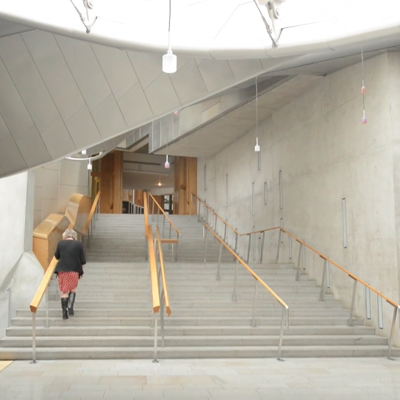Public policy highlights April 2020
Our policy committees have had a busy month analysing and responding to proposed changes in the law. We do this to positively influence the creation of a fairer and more just society through our active engagement with the Scottish and United Kingdom Governments, Parliaments, wider stakeholders and our membership.
You can read more about some of the month's highlights below:
COVID-19 – the Adults with Incapacity (Scotland) Act 2000
The Society’s Mental Health & Disability Sub-committee has been monitoring the changes made under the Coronavirus Act 2020 and the Coronavirus (Scotland) Act 2020 with regards to changes to the legal framework for adults with incapacity. In addition to issuing the Society’s own temporary guidance, the Sub-committee believes there is an opportunity to build on this through legislative reform. As such, it laid out proposed amendments to the Adults with Incapacity (Scotland) Act 2000 in a letter to the Cabinet Secretary for Health and Sport. The aim of these proposals is to:
- provide maximum support to the health and care sectors in response to priorities articulated by those sectors
- enable people to anticipate urgent medical and personal decisions that may become necessary, and to plan for them
- enable families of people with dementia, learning disability and other conditions to support and protect their loved ones at a time of crisis
- meet the expectations and demands of public, professionals and providers, including expectations around powers of attorney.
The Mental Health & Disability Sub-committee view these proposed amendments as vital in safeguarding vulnerable members of society.
Read the letter and the technical note.
COVID-19 – Solemn Criminal Trials
In order to respond to the Scottish Government’s discussion paper, the Society set up a working group under the chair of the Criminal Law Committee Convener, comprising members of the legal profession representing the COPFS, defence solicitors, local Bar Associations and solicitor advocates together with academic, lay and judicial representation and support from the Faculty of Advocates.
This response informed a briefing issued to the Cabinet Secretary for Justice and MSPs highlighting the Society’s stance. Whilst the Society does not view retaining the status quo as feasible, it does not support the introduction of judge only trials during the period of the COVID-19 pandemic and is not generally in favour of any adjustment to the sentencing powers. It believes that the option to retain current court facilities but enable social distancing during jury trials provides the basis for a practical workable solution. In conjunction with this, the Society supports having a smaller number of jurors but stresses a need to establish what the minimum number of jurors would be, preferring a minimum of seven jurors as this would allow for up to two jurors to become ill during a trial. However, the Society is not in support of a reduction from 15 jurors for High Court trials.
Medicines and Medical Devices Bill
The Society’s Criminal Law Committee responded to the Public Bill Committee’s call for evidence, having previously sent out a briefing at the second reading of the Bill in March.
The Committee recognised that the Bill provides opportunities for the pharmaceutical industry given that it is a major piece of post-Brexit legislation. However, given the current COVID-19 pandemic emergency, as the scope of the Bill supports the development of medicines and medical devices, it stressed that scrutiny is required given the implications arising from the potential use of these powers. It highlighted that achieving the balance between patient safety and access to medicines and medical devices is down to secondary regulations where further clarification is essential. The Committee requested that, regarding Scotland, it be noted that during the UK exit discussions there was recognition for the need to develop common frameworks to be in place that respected devolution in Scotland, Wales and Northern Ireland. These all comprised highly regulated areas of policy implemented by EU Directives, Regulations and Decisions and were transposed by UK Acts and subordinate legislation, Scottish Acts and Scottish subordinate legislation, as well as administrative, non-statutory arrangements.
In relation to the Bill’s creation of criminal offences where a person breaches certain notices, it is noted that the penalties applied differ across England, Scotland and Wales. The Society’s response advocates a consistent approach to sentencing provisions.
Energy Efficient Scotland: Improving energy efficiency in owner occupied homes – consultation
The Society’s Property Law Committee and Property and Land Law Reform Sub-committee responded to this Scottish Government consultation, which outlined proposals aimed at tackling the issue of improving energy efficiency and reducing the demand for heat in owner occupied homes.
The committees considered that these proposals form part of a range of wider issues concerning housing stock quality, noting that it is important to consider where the responsibility lies for improvement of housing stock and how individual owners can be encouraged to keep their property in good repair. The response highlighted that recent work on tenement maintenance and cladding raise similar issues in this regard. The committees noted that the proposals have the effect of charging individuals to make improvements to their property in order to achieve a Scottish Government aim. In response, they commented that it is important that sufficient support is put in place for individual homeowners to achieve the desired outcomes, in particular, recognising that in some cases, there may be significant costs involved in bringing a property up to the required standard.
The committees acknowledged that it is recognised that energy efficiency is a key feature for future housebuilding. However, they stressed the importance of having sufficient resource and knowledge within planning and housing departments of local authorities to support housebuilders to deliver appropriate outcomes.

